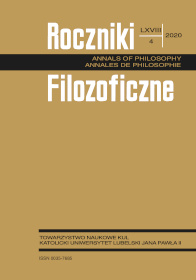Knowability as De Re Modality: A Certain Solution to Fitch Paradox
Abstrakt
Poznawalność jako modalność de re: pewne rozwiązanie paradoksu Fitcha
W artykule staramy się znaleźć nowe, intuicyjne rozwiązanie paradoksu Fitcha. Twierdzimy, że tradycyjne wyrażenie zasady poznawalności (p → ◊Kp) opiera się na błędnym rozumieniu poznawalności jako modalności de dicto. Zamiast tego proponujemy rozumieć poznawalność jako modalność de re. W artykule przedstawiamy minimalną logikę poznawalności, w której zasada poznawalności jest ważna, ale paradoks Fitcha już nie obowiązuje. Logikę charakteryzujemy semantycznie, a także poprzez podejście aksjomatyczne i tabelaryczne.
Bibliografia
Artemov, Sergei, Tudor Protopopescu. 2013. “Discovering knowability: a semantic analysis” Synthese 190, No. 16: 3349–76. DOI: 10.1007/s11229-012-0168-x.
Beal, J.C. 2000. “Fitch’s Proof, Verificationism, and the Knower Paradox.” Australasian Journal of Philosophy 78, No. 2: 241–47. DOI: 10.1080/00048400012349521.
Beal, J.C. 2009. “Knowability and Possible Epistemic Oddities.” In New Essays on the Knowability Paradox, edited by Joe Salerno, 105–25. Oxford: Oxford University Press. doi: 10.1093/ acprof:oso/9780199285495.003.0009.
van Benthem, Johan. 2009. “Actions That Make Us Know.” In New Essays on the Knowability Paradox, edited by Joe Salerno, 129–46. Oxford: Oxford University Press. doi: 10.1093/acprof:oso/9780199285495.003.0010.
van Benthem, Johan. 2004. “What one may come to know.” Analysis 64, No. 282: 95–105. doi: 10.1093/acprof:oso/9780199285495.003.0009
Brogaard, Berit, and Joe Salerno. 2008. “Knowability, Possibility and Paradox.” In New Waves in Epistemology, edited by Vincent F. Hendricks and Duncan Pritchard, 270–299. New York: Palgrave Macmillan.
Brogaard, Berit, and Joe Salerno. 2013. “Fitch’s Paradox of Knowability.” In The Stanford Encyclopedia of Philosophy, edited by Edward N. Zalta, https://plato.stanford.edu/archives/win2013/entries/fitch-paradox/, Metaphysics Research Lab, Stanford University, edition: winter 2013.
DeVidi, David, and Graham Solomon. 2001. “Knowability and Intuitionistic Logic.” Philosophia 28, No. 1-4: 319–34.
Dummett, Michael. 2001. “Victor’s Error.” Analysis 61, No. 1: 1–2. doi: 10.1093/analys/61.1.1.
Fagin, Ronald, Joseph Y. Halpern, Yoram Moses, and Moshe Y. Vardi. 1995. Reasoning about Knowledge. Cambridge, MA: MIT Press.
Fischer, Martin. 2013. “Some remarks on restricting the knowability principle,” Synthese 190, 16: 63-88. DOI 10.1007/s11229-010-9833-0.
Fitch, Frederic B. 2009. “A Logical Analysis of Some Value Concepts.” In New Essays on the Knowability Paradox, edited by Joed Salerno, 21–29. Oxford: Oxford University Press. DOI: 10.1093/acprof:oso/9780199285495.003.0003.
Fuhrmann, André. 2014. “Knowability as potential knowledge.” Synthese 191, No. 7: 1627–48. DOI: 10.1007/s11229-013-0340-y.
Goré, Rajeev. 1999. “Tableau systems for modal and temporal logics.” In Handbook of tableau methods, edited by Marcello D’Agostino, Dov M. Gabbay, Reiner Hähnle, and Joachim Posegga, 297–396. Dordrecht: Kluwer.
Jarmużek, Tomasz. 2013. “Tableau Metatheorem for Modal Logics.” In Trends in Logic. Vol. 41: Recent Trends in Philosphical Logic, edited by Roberto Ciuni, Heinrich Wansing, and Caroline Willkomennen, 103–26. Heidelberg, New York, Dordrecht, London: Springer International Publishing. doi: 10.1007/978-3-319-06080-4_8.
Kennedy, Neil. 2014. “Defending the Possibility of Knowledge.” Journal of Philosophical Logic 43, No. 2–3: 579–601. doi: 0.1007/s10992-013-9282-6.
Kooi, Barteld. 2016. “The Ambiguity of Knowability.” The Review of Symbolic Logic 9, No. 3: 421–28. DOI: 10.1017/S1755020315000416.
Kubyshkina, Ekaterina, and Dmitry V. Zaitsev. 2016. “Rational Agency From a Truth-Functional Perspective.” Logic and Logical Philosophy 25, No. 4: 499–520. doi:10.12775/ LLP.2016.016.
Kvanvig, Jonathan. 1995. “The Knowability Paradox and the Prospects for Anti-Realism.” Nous 29, No. 4: 481-500. doi: 10.2307/2216283.
Kvanvig, Jonathan. 2006. The Knowability Paradox. Oxford: Oxford University Press.
Maffezioli, Paolo, Alberto Naibo, and Sara Negri. 2013. “The Church-Fitch knowability paradox in the light of structural proof theory.” Synthese 190, No. 14: 2677–716. doi: 10.1007/ s11229-012-0061-7.
Meyer, John Jules Ch. 2001. “Epistemic Logic.” In Blackwell Guide to Philosophical Logic, edited by Lou Gouble. Oxford: Blackwell Publishing.
Meyer, John Jules Ch., and W. van der Hoek. 1995. Epistemic Logic for AI and Computer Science. Cambridge: Cambridge University Press.
Nelson, Michael. 2019. “The De Re/De Dicto Distinction. Supplement to Propositional Attitude Reports.” In The Stanford Encyclopedia of Philosophy, edited by Edward N. Zalta, https://plato.stanford.edu/entries/prop-attitude-reports/dere.html, Metaphysics Research Lab, Stanford University, edition: spring 2019.
Palczewski, Rafał. 2007. “Distributed Knowability and Fitch’s Paradox.” Studia Logica 86, No. 3: 455–78. DOI:10.1007/s11225-007-9070-9.
Pietruszczak, Andrzej, and Tomasz Jarmużek. 2018. “Pure modal logic of names and tableau systems.” Studia Logica 106, No. 5: 1261–89. doi: 10.1007/s11225-018-9788-6.
Priest, Graham. 2009. “Beyond the Limits of Knowledge.” In New Essays on the Knowability Paradox, edited by Joe Salerno, 93–104. Oxford: Oxford University Press. doi: 10.1093/ acprof:oso/9780199285495.003.0008.
Proietti, Carlo. 2012. “Intuitionistic Epistemic Logic, Kripke Models and Fitch’s Paradox.” Journal of Philosophical Logic 41, No. 5: 877-900. doi: 10.1007/s10992-011-9207-1.
Proietti, Carlo. 2016. “The Fitch-Church Paradox and First Order Modal Logic.” Erkenntnis, 81, No. 1: 87–104. doi: 10.1007/s10670-015-9730-5.
Salerno, Joe. 2009. “Knowability Noir: 1945–1963.” In New Essays on the Knowability Paradox, edited Joe Salerno, 29–48. Oxford: Oxford University Press.
Tennant, Neil, Revamping the Restriction Strategy, in: New Essays on the Knowability Paradox, ed. Salerno J., Oxford University Press, Oxford, 2009, pp. 223–38. doi: 10.1093/acprof:oso/ 9780199285495.003.0015.
Tennant, Neil. 1997. The Taming of the True. Oxford: Oxford University Press.
Wansing, Heinrich. 2002. “Diamonds Are A Philosopher’s Best Friends. The Knowability Paradox and Modal Epistemic Relevance Logic.” Journal of Philosophical Logic 31: 591-612. doi: 10.1023/A:102125651.
Williamson, Timothy. 1982. “Intuitionism Disproved?” Analysis 42: 203–207. doi: 10.1093/ analys/42.4.203
Williamson, Timothy. 1992. “On Intuitionistic Modal Epistemic Logic.” Journal of Philosophical Logic21: 63–89. doi: 10.1007/BF00126497.
Williamson, Timothy. 2000. Knowledge and Its Limits. Oxford: Oxford University Press.
Zemach, Eddy M. 1987. “Are There Logical Limits For Science?” The British Journal for the Philosophy of Science 38, No. 4: 527–32. doi: 10.1093/bjps/38.4.527.
Copyright (c) 2020 Roczniki Filozoficzne

Utwór dostępny jest na licencji Creative Commons Uznanie autorstwa – Użycie niekomercyjne – Bez utworów zależnych 4.0 Międzynarodowe.





